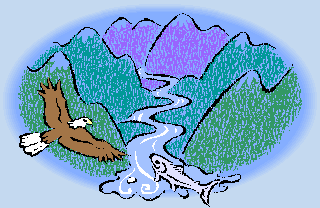
An Email Publication About Water and Water Treatment
April 2011
An Email Publication About Water and Water Treatment April 2011 |
In this brand new Occasional you'll hear about the Dead Sea, dead dolphins, and the Heart of Dryness. Oil spills, gasoline leaks, and GM insecticide in rivers. Reservoirs with a putrid stench, high sediment, and no water. Learn about the Big Bucket, the Mighty Eliminator, the Lower Mekong Dam, Mark Ruffalo's war on fracking, and the astounding Law of Mother Earth. The revival of rain barrels, plus a nostalgia song for rain barrel shouters and cellar door sliders. Hear how all plastics aren't created equal, plus news of high density polyethylene and synthetic xenoestrogens. You'll learn how pwgazette.com became purewaterproducts.com, what took down the water plant at Henryetta, OK, when Drinking Water Week will be celebrated and, as always, much, much more. The Occasional is overseen by Pure Water Gazette editor Hardly Waite. |
 |
While you were planning your Earth Day costume, dying your Easter eggs, and keeping your eye peeled for tornados, a lot of important things happened in the world of water. To hear all about it, read on.Water News for April 2011A water treatment plant employee in Gilbert AZ was arrested on domestic terrorism charges after he apparently attempted to cause an explosion at the plant. "He wasn't a gun toting radical by no means," said a neighbor. Three officials of Ecological Systems Inc. (ESI), an oil reclamation company that operates a centralized waste treatment facility in Indianapolis, have been sentenced in U.S. District Court, Southern District of Indiana for felony violations of the Clean Water Act.
Mass dolphin deaths are being linked to the BP oil spill. Texas Water Day was celebrated April 27. In a ceremony in Austin,. James Workman, author of “Heart of Dryness,”explained how the last Bushmen can offer unexpected solutions to help us endure the coming age of permanent drought. . According to Mr. Workman, “We don’t govern water. Water governs us." Kansas State University students participated in a project designed to provided clean water in Guatemala. In a disturbing development:, it has been discovered that an insecticide resulting from genetically modified (GM) crops grown extensively in the United States and other parts of the world has leached into the water of the surrounding environment. The enlightened government of Bolivia is set to pass the world's first laws granting to all nature rights equal to those of humans. The Law of Mother Earth, now agreed upon by politicians and grassroots social groups, redefines the country's rich mineral deposits as "blessings" and is expected to lead to radical new conservation and social measures to reduce pollution and control industry. The right to clean water is one of the eleven basic "rights of nature" specified in the law. National Parks and Forests are not only sources of entertainment and relaxation. You may not know that national forests are the source of drinking water for over a million Americans. Like to sign a petition urging the administration to protect these invaluable water sources? " In the past century, poorly-planned, large dams have choked more than half of our world's big rivers, wiping out species, flooding vast swaths of land, displacing millions of, mostly poor, marginalized and indigenous people. We don't need more of these when there are better renewable energy options out there that we can, and must, explore. Big dams need to go the way of the dinosaurs." Read about the growing resistance to the dam across the Lower Mekong. In Tampa, gasoline-contaminated water as well as an estimated 210 tons of gasoline-contaminated soil were excavated after the discovery of a gasoline leak at the Chevron Petroleum Terminal. A hazardous materials team was called out to contain a chlorine spill at a Columbia, SC water treatment plant. American Water, the largest publicly traded U.S. water and wastewater utility company, celebrated its 125th anniversary. (At the celebration, tap water flowed like champagne.) Workers in Sultan, WA discovered mud coming from a water pipe and on investigation learned that the lake, which supplies 95% of the community's water, had been drained completely through a hole in the bottom of the dam. Actor Mark Ruffalo urged President Obama to call a vote for more comprehensive hydrofracking regulations. "Horizontal hydraulic fracturing, or 'hydrofracking,' is a process by which natural gas is extracted by pumping a mixture of water, sand and chemicals into the ground. The natural gas is forcibly released when this high-pressure "frack" fluid comes into contact with shale. Environmental groups claim the process pollutes groundwater and contaminates drinking water supplies." A mysterious putrid, sewer-like stench that appears to be emanating from Elkhart, Indiana's wastewater treatment plant is puzzling officials and causing residents in one neighborhood to hold their noses.
The National Association of Water Companies (NAWC) has been designated as presenting sponsor of the inaugural Water for People Gala to Honor Women in Water. The charity event will be held in Washington, D.C. on Monday, June 13, at the National Museum of Women in the Arts. Heavy rains in Henryetta, OK have caused a water shortage by overwhelming the city's treatment plant with turbidity. Residents in Douglas County, CO are having to rely on cisterns as groundwater supplies dwindle. Legionella, the bacterium that is said to cause Legionnaires disease, was detected in the water supply of the Sacred Heart Medical Center in Seattle. Three patients have contracted Legionnaires since January and one has died, though hospital officials deny that the bacteria were the cause of death. The Obama administration released a national clean water framework that outlines a series of actions underway and planned across federal agencies to ensure the integrity of the waters Americans rely on every day for drinking, swimming and fishing, and that support farming, recreation, tourism and economic growth.
In Praise of Tap WaterFrom the press release announcing American Water's 125th Anniversary celebration: "The seemingly small decision to drink tap water rather than bottled water can have a major impact on the environment," commented Dr. Mark LeChevallier, director of Innovation and Environmental Stewardship for American Water. "Disposable plastic bottles are burdening our landfills and increasing fuel consumption through their production and delivery." More than 1.5 million gallons of oil are used each year to produce the disposable plastic water bottles consumed in the U.S., and significant amounts of fuel are required to transport the bottles, as well. Additionally, consumers can realize significant savings by relying less on disposable water bottles and more on tap water in refillable bottles. Tap water is typically available from the faucet for less than a penny a gallon as a national average. Depending on the brand, bottled water costs 250 to 10,000 times more than tap water. Consumers drinking their recommended eight glasses of water a day from the tap, may spend approximately $3.65 (based on a glass of water being 8 ounces) a year. Purchasing the same amount in bottled water can add up to $1,400 annually. Ounce-for-ounce, bottled water can cost more than gasoline or even milk. The Occasional's Comment: Assuming even a five to one usage ratio, home-produced reverse osmosis water would cost (according to American Water's figures) about $18 per year vs. $1,400 for bottled water. This puts all the "RO wastes water" concerns in a different perspective. From the environmental point of view, saying "I don't want to waste water with a home RO unit, so I'll drink bottled water," ignores the water and energy used in producing the bottled water and the bottle, plus the large energy expenditure for transporting it to the consumer. Long live tap water, but make it better than bottled water by treating it in your home with a point-of-use drinking water filter or reverse osmosis unit.
Barrels Provide Gardeners Savings from a Rainy DayBarrels Provide Free Irrigation Water for Use in Dry Summer Monthsby Sarah JacksonGardeners use a lot of water, especially during the summer months when local rains slow to a trickle right when our lawns, flowers and vegetables need moisture the most.
Conservationists and green-living advocates are asking: Do we really need to be using drinking water on our ornamental landscapes? Every inch of rain that falls on a 1,500-square-foot roof can provide about 900 gallons of free water, more than 30,000 gallons in Everett in an average year. Here are some tips about rain barrels. Don't drink the water: Collected rainwater is only as clean as your roof and gutters, where birds and animals may drop their waste. Use it with caution for watering some vegetables, but it is best used on ornamental plants and lawns. Avoid overhead irrigation of food crops when using rain barrel water, especially leafy greens. Always wash garden vegetables with tap water before eating them. Raise it up: Build a raised platform from cinder blocks and place your rain barrel on top. This give you more room to fit a watering can beneath the spigot.
|
||||||||||||